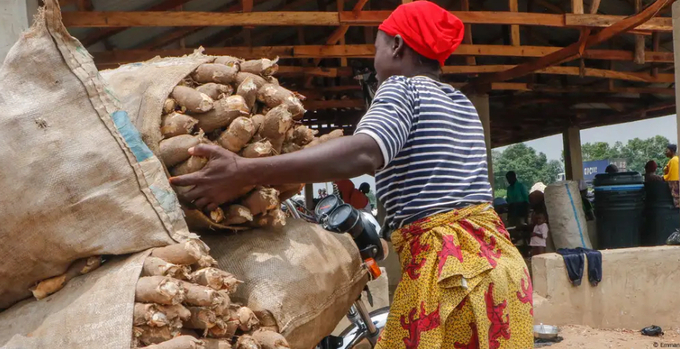June 20, 2025 | 17:55 GMT +7
June 20, 2025 | 17:55 GMT +7
Hotline: 0913.378.918
June 20, 2025 | 17:55 GMT +7
Hotline: 0913.378.918

The Nigerian government has announced an agricultural investment plan that includes boosting productivity in staple cropsImage.
Nigeria has secured a loan of $134 million (€127 million) to invest in farming, Agriculture Minister Abubakar Kyari announced on Thursday.
President Bola Tinubu's government has previously said that boosting food security is a goal of his administration.
Kyari said in a post on social media that the plan aimed "to boost productivity in key staple crops, including wheat, rice, and maize, for both dry and wet season farming."
He said that Nigeria's federal government planned to "provide subsidized agricultural inputs to 250,000 wheat farmers and 150,000 rice farmers this season" as part of its agricultural support program.
The minister said the government would "establish a minimum guarantee price for crops, helping to stabilize farmers' incomes and reduce reliance on imports."
The $134 million loan was secured from the African Development Bank.
Around 25 million Nigerians face "acute food insecurity," according to figures from the Cadre Harmonise — a tool for assessing food security. This number is expected to rise to 33 million in 2025.
The report cited the economic effects of the continuous devaluation of the Nigerian currency, the naira, against the dollar and Tinubu's decision last year to abolish a fuel subsidy that had been in place for decades. In June of this year, annual food-price inflation was recorded at 40.9%.
Northern Nigeria has become increasingly arid due to climate change and deforestation while violence and desertification have sparked conflicts between farming communities and nomadic herdsmen.
Last month, 1.6 million hectares of farmland were destroyed in central Nigeria by torrential rains.Western and central African countries were also hit by flooding in September.
(DW)
![Turning wind and rain into action: [9] Digitizing hydrometeorological data in response to climate change](https://t.ex-cdn.com/nongnghiepmoitruong.vn/608w/files/news/2025/06/17/z6704423696987_15fd32ffc26d590d204d520c9dac6786-nongnghiep-165943.jpg)
(VAN) Farmers have begun accessing hydrometeorological applications to adjust their cropping schedules, aiming to ensure productivity and adapt to climate change.
![Turning wind and rain into action: [8] Real-time salinity detection and early warning technology](https://t.ex-cdn.com/nongnghiepmoitruong.vn/608w/files/news/2025/06/17/z6704423696987_15fd32ffc26d590d204d520c9dac6786-nongnghiep-151127.jpg)
(VAN) Thanks to the integration of modern hydrological-hydraulic models, remote sensing technologies, and artificial intelligence, the accuracy of hydrological forecasting has significantly improved.
![Turning wind and rain into action: [7] Early disaster warnings help marine farmers minimize losses](https://t.ex-cdn.com/nongnghiepmoitruong.vn/608w/files/news/2025/06/17/z6704423696987_15fd32ffc26d590d204d520c9dac6786-nongnghiep-142942.jpg)
(VAN) In recent years, thanks to early disaster warnings and forecasting, marine farmers in Khanh Hoa province have been able to reduce risks and losses, thereby improving production efficiency.
![Turning wind and rain into action: [6] ‘Four on-the-spot’ disaster management software](https://t.ex-cdn.com/nongnghiepmoitruong.vn/608w/files/news/2025/06/17/e5a48259d6a262fc3bb3-nongnghiep-183800.jpg)
(VAN) By simply activating the scenario on the disaster management software, the relevant authorities immediately know how many households need to be evacuated, where to evacuate them to, and by what means of transportation…
![Turning wind and rain into action: [5] Hue applies modern technology in disaster forecasting](https://t.ex-cdn.com/nongnghiepmoitruong.vn/608w/files/news/2025/06/17/z6704423696987_15fd32ffc26d590d204d520c9dac6786-nongnghiep-093938.jpg)
(VAN) In Hue city, modern technology has recently been applied in meteorological and hydrological forecasting and warning, helping to reduce the damage caused by natural disasters.

(VAN) A cutting-edge farming technique being implemented on an experimental ranch in Arizona's Sonoran Desert has already saved a billion gallons of water over five years, according to Civil Eats.

(VAN) Poultry and pig production and the environment can be boosted through enhanced water technology, according to new research.